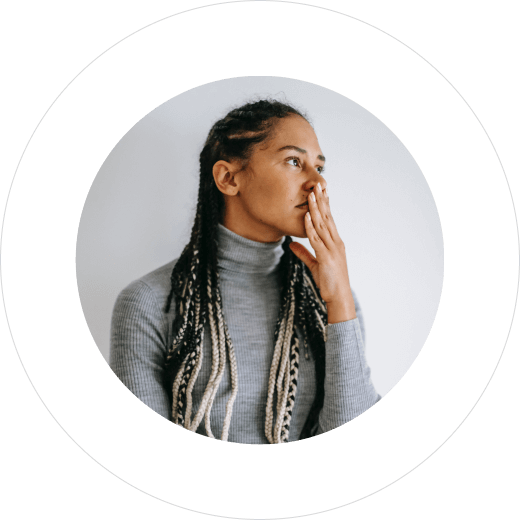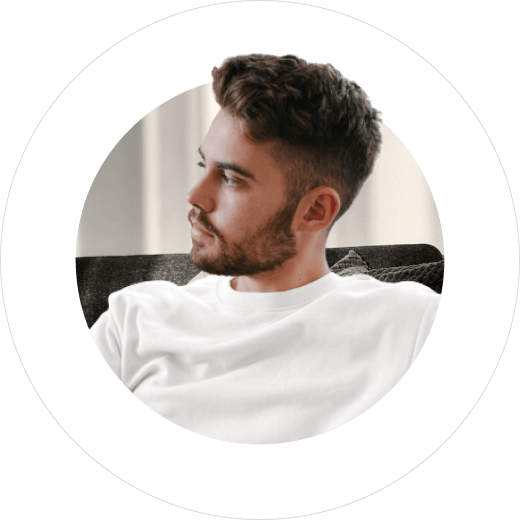Online Phobia Treatment. Overcome Your Fears and Anxiety
- About
- How we work
- Symptoms
- Therapy
- Medications

Phobias are overwhelming and debilitating. But solutions do exist
MEDvidi doctors use evidence-based treatments for phobias to help you retake control over your life.
What Are Phobias?
Phobias’ definition describes them as persistent, intense fears of specific objects, activities, or situations. People with simple phobias often exaggerate the danger posed
by the triggers.
While some phobias may go unnoticed or don’t require treatment, other phobic anxiety disorders (social phobia, agoraphobia) often interfere with a person’s daily functioning.
One may be aware of having a specific phobia but not be able to shift from frightening thoughts and irrational beliefs.

In such cases, professional help is the best choice
For people with severe symptoms, every day is all about phobias. Fortunately, with the right treatment, you can stop avoiding the disturbing situations and live the peaceful life you deserve.
In order to prescribe medication, a prescribing provider has to be licensed in the state where the patient is located.
Currently, we have prescribing providers who are licensed to serve residents of Florida, California, New York, Texas,
Washington, Colorado, Illinois, Arizona, Oklahoma, and Pennsylvania.
In order to prescribe medication, a prescribing provider has to be licensed in the state where the patient is located.
Currently, we have prescribing providers who are licensed to serve residents of Florida, California, New York, Texas,
Washington, Colorado, Illinois, Arizona, Oklahoma, and Pennsylvania.
In order to prescribe medication, a prescribing provider has to be licensed in the state where the patient is located.
Currently, we have prescribing providers who are licensed to serve residents of Florida, California, New York, Texas,
Washington, Colorado, Illinois, Arizona, Oklahoma, and Pennsylvania.
In order to prescribe medication, a prescribing provider has to be licensed in the state where the patient is located.
Currently, we have prescribing providers who are licensed to serve residents of Florida, California, New York, Texas,
Washington, Colorado, Illinois, Arizona, Oklahoma, and Pennsylvania.
Phobias Treatment at MEDvidi in Three Steps
2Initial appointment
See a mental health expert from wherever you like via smartphone or laptop.
1A free assessment
See a mental health expert from wherever you like via smartphone or laptop.
3Ongoing treatment
See a mental health expert from wherever you like via smartphone or laptop.
Show more info about
Phobias treatment
We Know How to Help You with…
Complex Phobias
- Agoraphobia
- Social phobia
- …and others
Specific/Simple Phobias
- AIDS phobia
- Social phobia
- Doctor phobia
- Fear of public speaking
- …and others
In order to prescribe medication, a prescribing provider has to be licensed in the state where the patient is located.
Currently, we have prescribing providers who are licensed to serve residents of Florida, California, New York, Texas,
Washington, Colorado, Illinois, Arizona, Oklahoma, and Pennsylvania.
In order to prescribe medication, a prescribing provider has to be licensed in the state where the patient is located.
Currently, we have prescribing providers who are licensed to serve residents of Florida, California, New York, Texas,
Washington, Colorado, Illinois, Arizona, Oklahoma, and Pennsylvania.
In order to prescribe medication, a prescribing provider has to be licensed in the state where the patient is located.
Currently, we have prescribing providers who are licensed to serve residents of Florida, California, New York, Texas,
Washington, Colorado, Illinois, Arizona, Oklahoma, and Pennsylvania.
In order to prescribe medication, a prescribing provider has to be licensed in the state where the patient is located.
Currently, we have prescribing providers who are licensed to serve residents of Florida, California, New York, Texas,
Washington, Colorado, Illinois, Arizona, Oklahoma, and Pennsylvania.
Know Your Phobia. Symptoms to Be Attentive to:
- An instant feeling of intense fear when being exposed to the trigger or thinking about it
- Avoiding frightening activity or an object by all means
- Knowing that your fear is out of proportion and irrational but being unable to control it
- Having physical symptoms of panic (nausea, tachycardia, sweating, chest tightness, etc.)

Social phobia symptoms:
- Worrying about being humiliated, judged, or embarrassed in social situations
- Avoiding interactions with strangers and general social activities
- Being afraid of someone noticing your anxiety
Agoraphobia symptoms:
- Excessive fear of situations where one might feel difficult to escape (public transport, shops, parking lots, etc)
- Fear of losing control in unfamiliar and unsafe environments
- Avoiding crowded and open spaces
Try the SmartCare symptoms checker to have a quick social phobia assessment online
In order to prescribe medication, a prescribing provider has to be licensed in the state where the patient is located.
Currently, we have prescribing providers who are licensed to serve residents of Florida, California, New York, Texas,
Washington, Colorado, Illinois, Arizona, Oklahoma, and Pennsylvania.
In order to prescribe medication, a prescribing provider has to be licensed in the state where the patient is located.
Currently, we have prescribing providers who are licensed to serve residents of Florida, California, New York, Texas,
Washington, Colorado, Illinois, Arizona, Oklahoma, and Pennsylvania.
In order to prescribe medication, a prescribing provider has to be licensed in the state where the patient is located.
Currently, we have prescribing providers who are licensed to serve residents of Florida, California, New York, Texas,
Washington, Colorado, Illinois, Arizona, Oklahoma, and Pennsylvania.
In order to prescribe medication, a prescribing provider has to be licensed in the state where the patient is located.
Currently, we have prescribing providers who are licensed to serve residents of Florida, California, New York, Texas,
Washington, Colorado, Illinois, Arizona, Oklahoma, and Pennsylvania.
In order to prescribe medication, a prescribing provider has to be licensed in the state where the patient is located.
Currently, we have prescribing providers who are licensed to serve residents of Florida, California, New York, Texas,
Washington, Colorado, Illinois, Arizona, Oklahoma, and Pennsylvania.
Get a Personalized Treatment Plan at MEDvidi
The basic treatment plan for phobias includes psychotherapy and learning self-help techniques. It can be supplemented with short-term pharmacological treatment in some cases.
With the help of a mental health professional and your own efforts, you will become more realistic about your fears and more confident about overcoming them.
Your Therapy Plan Starts with Setting the Right Goals
To notice the result of treatment, you have to know what it is you want to achieve. These are some examples of therapy goals and objectives:

- Keeping calm when facing the triggers of your phobia
- Reducing the symptoms when alone and in public
- Changing unhealthy behaviors and improving coping skills
- Managing irrational thoughts and negative self-image
In order to prescribe medication, a prescribing provider has to be licensed in the state where the patient is located.
Currently, we have prescribing providers who are licensed to serve residents of Florida, California, New York, Texas,
Washington, Colorado, Illinois, Arizona, Oklahoma, and Pennsylvania.
In order to prescribe medication, a prescribing provider has to be licensed in the state where the patient is located.
Currently, we have prescribing providers who are licensed to serve residents of Florida, California, New York, Texas,
Washington, Colorado, Illinois, Arizona, Oklahoma, and Pennsylvania.
In order to prescribe medication, a prescribing provider has to be licensed in the state where the patient is located.
Currently, we have prescribing providers who are licensed to serve residents of Florida, California, New York, Texas,
Washington, Colorado, Illinois, Arizona, Oklahoma, and Pennsylvania.
In order to prescribe medication, a prescribing provider has to be licensed in the state where the patient is located.
Currently, we have prescribing providers who are licensed to serve residents of Florida, California, New York, Texas,
Washington, Colorado, Illinois, Arizona, Oklahoma, and Pennsylvania.
Online Therapy for Phobias
In phobia treatment, therapy plays a key role. It allows a patient to work on the root causes of their fear and learn how to cope with panic healthily. At MEDvidi, you can attend online therapy for phobias, which is as effective as in-person sessions.
Cognitive-behavioral Therapy (CBT)
For social phobia, behavioral therapy is the first-line treatment option.
Mindfulness
Training
For social phobia, behavioral therapy is the first-line treatment option.
Exposure
Therapy
For social phobia, behavioral therapy is the first-line treatment option.
Medication Management
Online mental health counseling and medications create an effective combination of phobia treatments. Although therapy is usually successful in reducing the impact of phobia on the patient’s life, medicines may be prescribed in specific cases.
- Antidepressants
- Benzodiazepines
- Sedatives
- Beta-blockers
How We Determine the Best Medication for You
- Assessing your symptoms and making a diagnosis
- Choosing the most suitable treatment option between online therapy and medication (or their combination)
- Determining the effect that should be achieved with pharmacological treatment

Try online therapy with medication management at MEDvidi to improve your anxiety symptoms.
In order to prescribe medication, a prescribing provider has to be licensed in the state where the patient is located.
Currently, we have prescribing providers who are licensed to serve residents of Florida, California, New York, Texas,
Washington, Colorado, Illinois, Arizona, Oklahoma, and Pennsylvania.
In order to prescribe medication, a prescribing provider has to be licensed in the state where the patient is located.
Currently, we have prescribing providers who are licensed to serve residents of Florida, California, New York, Texas,
Washington, Colorado, Illinois, Arizona, Oklahoma, and Pennsylvania.
Know More about Anxiety and Phobias
Becoming aware of the symptoms, causes, and helpful interventions is the first step
to overcoming anxiety, panic, and phobias. Explore the MEDvidi blog to know the basics and possible treatments for phobias.

Your Phobia Treatment Starts Here
Read Also

ADHD
Example of displaying a title of an article in three lines

ADHD
Example of displaying a title of an article in three lines

ADHD
Example of displaying a title of an article in three lines

ADHD
Example of displaying a title of an article in three lines

ADHD
Example of displaying a title of an article in three lines

ADHD
Example of displaying a title of an article in three lines

ADHD
Example of displaying a title of an article in three lines

ADHD
Example of displaying a title of an article in three lines